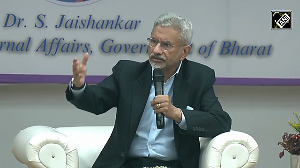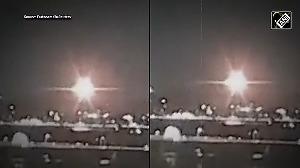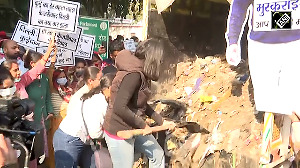It was meant to be a bridge for peace, trade, travel and industry. The bridge connecting India to Sri Lanka over the Palk Strait was also touted as a fine way to improve relations between the two neighbours.
But the fate of the bridge --estimated to cost $500 million -- that was to link the western tip of Talaimannar in Sri Lanka to Dhanuskodi in Tamil Nadu now hangs in the balance thanks to stiff opposition to the project by Tamil Nadu Chief Minister J Jayalalithaa.
On Thursday, she wrote to Prime Minister Atal Bihari Vajpayee asking him to drop the idea of an Indo-Lanka bridge, for it would 'jeopardize national security.'
Jayalalithaa said her main fear was that the Liberation Tigers of Tamil Eelam, the guerrilla force fighting for a separate homeland in Sri Lanka, would bring its terrorism to Tamil Nadu and India.
Senior government officials in Chennai believe Jayalalithaa has reasons to be worried over the proposed bridge because Tamil Nadu is home to Tamil refugees from Sri Lanka. According to government estimates, some 200,000 refugees live in Tamil Nadu. The majority stay in camps. The rest live on their own. Besides these two categories, there are detained Tamil militants in Tamil Nadu jails.
A home ministry official in Tamil Nadu pointed out that Jayalalithaa opposed the bridge project because a recent state police report said opening a land link between India and Sri Lanka would pose unprecedented security risks for Tamil Nadu.
"We do not want another resumption of terrorist activities in Tamil Nadu. The chief minister has asked Prime Minister Vajpayee why India should go in for such a bridge when the ethnic problem in Sri Lanka is still a burning issue," the official told rediff.com
The Tamil Nadu government has not yet got a response to Jayalalithaa's letter to the prime minister. But the official said "the Vajpayee government cannot go ahead with the bridge project without permission from the Tamil Nadu government."
The proposal to build a bridge over the Palk Strait first came up during the signing of the India-Sri Lankan agreement by then Indian prime minister Rajiv Gandhi and then Sri Lankan president J R Jayewardene on July 29, 1987. But ethnic fighting in Sri Lanka and the failed Indian Peace Keeping Force mission to the island nation sealed the idea.
The proposal got a fresh lease of life during Sri Lankan Prime Minister Ranil Wickramasinghe's visit to India last year. At Wickramasinghe's behest, the Board of Investment of Sri Lanka submitted the bridge proposal to the Vajpayee government.
At the end of Wickramasinghe's visit, India and Sri Lanka issued a statement endorsing the proposal.






 © 2025
© 2025